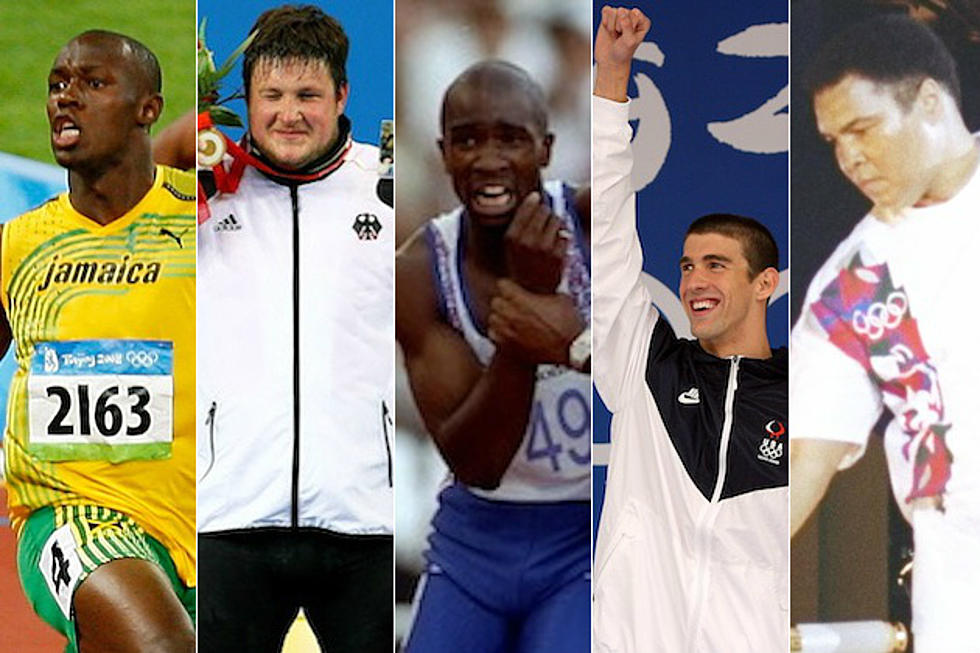
10 Unforgettable Moments from the Olympics
The Summer Olympics begin this weekend in London. For more than a century, the modern Olympic games have provided a global stage for athletes to deliver unforgettable moments of competition, courage and compassion. The world’s best athletes are almost sure to produce a few incredible moments in London that will be remembered long after the closing ceremony on August 12. Here are 10 of our favorite all-time moments from the Olympics:
Most Dominant Performance (Individual): Usain Bolt, 2008
Jamaican sprinter Usain Bolt won both the 100 and 200 meter events at the 2008 Summer Olympic Games at Beijing. More amazingly, Bolt captured both gold medals in world record times. In fact, Bolt was so far ahead in the 100 meter final that he began to celebrate. Though the celebration slowed his time, Bolt still set a world record of 9.69 seconds.
Most Dominant Performance (Team): US Men’s Basketball Team, 1992
After watching its basketball dominance erode for more than 20 years, the United States sent a team of NBA players — featuring Michael Jordan, Magic Johnson, Larry Bird and more — to the 1992 Summer Games in Barcelona. The ‘Dream Team’ team went on to defeat its opponents by an average of more than 40 points on its way to the gold medal.
Biggest Upset (Individual): Rulon Gardner, 2000
Russian wrestler Alexander Karelin was a three-time, defending Olympic champion when he faced American Rulon Gardner at the Summer Olympics in Sydney in 2000. Though Karelin hadn’t lost a Greco-Roman wrestling match in 13 years, Gardner took him to overtime and was able to defeat the great champion on points. While other Olympic athletes have been surprise medalists, no one else has had to defeat such a seemingly insurmountable challenge as Gardner did.
Biggest Upset (Team): US Men’s Hockey Team, 1980
Winning nearly every world championship and Olympic tournament between 1954 and 1991, the Soviet Union national hockey team was an international juggernaut. Amazingly, a group of American amateurs defeated the Soviets, 4-3, in the semifinals of the 1980 Winter Olympics in Lake Placid. Team captain Mike Eruzione notched the go-ahead goal in the third period in front of a raucous home crowd. After the US team won the gold medal game against Finland two days later, Eruzione exhorted his teammates to join him on the platform during the medal ceremony.
Most Shocking Display: Tommie Smith, John Carlos and Peter Norman, 1968
With their home country embroiled in a battle for civil rights for all Americans, medal-winning sprinters Tommie Smith (gold) and John Carlos (bronze) raised gloved hands in a Black Power salute during the medal ceremony for the 200-meter race in Mexico City. Many fans forget that both men were also shoeless to support impoverished African-Americans. Australian Peter Norman, the silver medalist, wore a human rights badge to help support his fellow competitors. All three men were ostracized for a long time following the gesture.
Biggest Surprise: Muhammad Ali, 1996
After a series of America’s biggest Olympic heroes passed the Olympic torch around Olympic Stadium during the opening ceremonies of the 1996 Summer Games in Atlanta, the identity of the final torch bearer was revealed. Former Olympic boxing champion Muhammad Ali, his body wracked by Parkinson’s disease, transferred the fire to the stadium cauldron. Considering how essential Ali was in creating a template for modern amateur and professional athletes, his surprise appearance ranks among the great Olympic moments in history.
Most Amazing Feat of Strength: Matthias Steiner, 2008 and Kerri Strug, 1996 (tie)
German weightlifter Matthias Steiner won the gold medal in the super heavyweight category at the 2008 Summer Olympics in Beijing by markedly exceeding his personal bests and drawing inspiration from his personal tragedies. As he was awarded the gold medal for his clean and jerk of 258 kg, Steiner stood on the platform with a photo of his wife, who died in a car accident in 2007. The moment served to honor the many people behind the athletes, some of whom are just as responsible for their inner strength.
While US Olympian Kerri Strug was just one member of the ‘Magnificent Seven’ women’s gymnasts to win at the 1996 Summer Olympics in Atlanta, the team could not have achieved the gold medal without her. Strug, who hurt her ankle on an earlier vault, fearlessly attempted another vault despite the injury. Strug landed the vault to guarantee her country the gold, however, she damaged her ankle enough to keep her from competing in the individual events.
Best Spirit of Competition: John Stephen Akhwari, 1968 and Derek Redmond, 1992 (tie)
Olympic marathon runners traversed the high altitude of Mexico City in 1968 with Mamo Walde of Ethiopia winning the gold. More than an hour after Wolde finished, Tanzanian runner John Stephen Akhwari gimped into the Olympic stadium suffering from a dislocated knee and other injuries sustained due to a fall during the race. While he placed last, Akhwari’s commitment to finishing the race puts his feat among the most exemplary Olympic moments ever.
As Derek Redmond was completing the semi-finals of the 400 meters in the 1992 Summer Olympics in Barcelona, the British runner tore his hamstring halfway to the finish line. In great pain, but resolute, Redmond attempted to finish the race. As Redmond dragged on toward the finish line, his father, Jim, emerged from the stands to help his son, letting go at the end so he could finish the race by himself.
Most Incredible Performance Under Duress: Jesse Owens, 1936
As Adolf Hitler goaded other nations by asserting the prowess of the Aryans and denigrating African-Americans, Jesse Owens won four gold medals at the 1936 Summer Olympics in Berlin: the 100 meters, the 200 meters, the long jump, and the 4×100 meter relay. In completing such a dominant performance, Owens established himself as one of the world’s best athletes and rendered Hitler’s argument meaningless.
Most Successful Athlete: Michael Phelps, 2008
American swimmer Michael Phelps’ victory as part of the US men’s 4×100-meter medley relay team gave the swimming superstar a record eight gold medals at the Summer Olympics in Beijing in 2008. A winner of 16 total Olympic medals over two Olympic games, Phelps’ now holds the all-time record for most Olympic gold medals at 14. Few Olympians will ever be able to match his greatness.
More From Awesome 98









